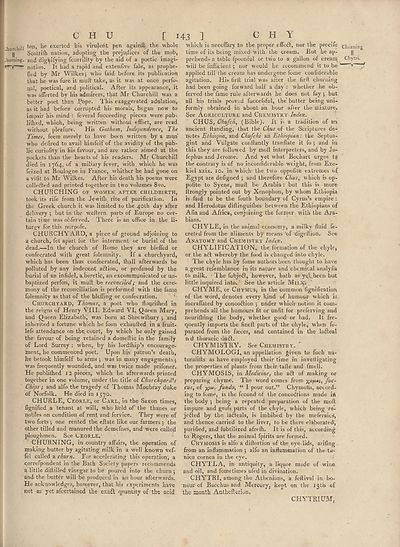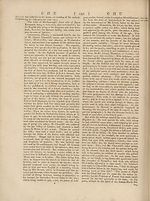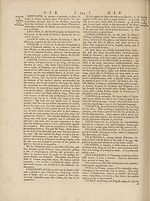Encyclopaedia Britannica, or, a Dictionary of arts, sciences, and miscellaneous literature : enlarged and improved. Illustrated with nearly six hundred engravings > Volume 6, CHI-Crystallization
(153) Page 143
Download files
Complete book:
Individual page:
Thumbnail gallery: Grid view | List view

C H U [i
I,,, rchiu ton, he exerted his virulent pen againft. the whole
|| Scottilh nation, adopting the prejudices of the mob,
Inhuming, and dignifying fcurrility by the aid of a poetic imagi-
* nation. It had a rapid and extenfive fale, as prophe-
fitd by Mr Wilkes; who faid before its publication
that he was fure it muft take, as it was at once perfo-
nal, poetical, and political. After its appearance, it
was afferted by his admirers, that Mr Churchill was a
better poet than Pope. This exaggerated adulation,
as it had before corrupted his morals, began now to
impair his mind feveral fucceeding pieces were pub-
lilhed, which, being written without effort, are read
without pleafure. His Gotham, Independence, The
Times, feem merely to have been written by a man
who defired to avail himfelf of the avidity of the pub¬
lic curiofity in his favour, and are rather aimed at the
pockets than the hearts of his readers. Mr Churchill
died in 1764, of a miliary fever, with which he was
feized at Boulogne in France, whither he had gone on
a vifit to Mr Wilkes. After his death his poems were
colle£fed and printed together in two volumes 8vo.
CHURCHING of women, after childbirth,
took its rife from the Jewifh rite of purification. In
the Greek church it was limited to the 40th day after
delivery ; but in the weftern parts of Europe no cer¬
tain time was obferved. There is an office in the li¬
turgy for this purpofe.
CHURCHYARD, a piece of ground adjoining to
a church, fet apart for the interment or burial of the
dead.—In the church of Rome they are bleffed or
confecrated with great folemnity. If a churchyard,
which has been thus confecrated, ffiall afterwards be
polluted by any indecent adlion, or profaned by the
burial of an infidel, a heretic, an excommunicated or un¬
baptized perfon, it muft be reconciled; and the cere¬
mony of the reconciliation is performed with the fame
folemnity as that of the bleffing or confecration.
Churchyard, Thomas, a poet who flourifhed in
the reigns of Henry VIII. Edward Vp Queen Mary,
and Queen Elizabeth, was born at Shrewfbury ; and
inherited a fortune which he foon exhaufted in a fruit-
lefs attendance on the court, by which he only gained
the favour of being retained a domeftic in the family
of Lord Surrey : when, by his lordftvip’s encourage¬
ment, he commenced poet. Upon his patron’s death,
he betook himfelf to arms ; was in many engagments;
was frequently wounded, and was twice made prifoner.
He publiffied 12 pieces, which he afterwards printed
together in one volume, under the title of Churchyard's
Chips ; and alfo the tragedy of Thomas Moubray duke
of Norfolk. He died in 1570.
CHURLE, Ceorle, or Carl, in the Saxon times,
fignified a tenant at will, who held of the thanes or
nobles on condition of rent and fervice. They were of
two forts ; one rented the eftate like our farmers ; the
other tilled and manured the demefnes, and were called
ploughmen. See CEORLE.'
CHURNING, in country affairs, the operation of
making butter by agitating milk in a well known vef-
fel called a churn. For accelerating this operation, a
Correfpondent in the Bath Society papers recommends
a little diftilled vinegar to be poured into the churn ;
and the butter will be produced in an hour afterwards.
He acknowledges, however, that his experiments have
not as yet afcertained the exaft quantity of the acid
43 ] e h y
which is neceffary to the proper effe£t, nor the precife cimming
time of its being mixed with the cream. But he ap- ||
prehends a table fpoonful or two to a gallon of cream Chytri.
will be fufficient; nor would he recommend it to be
applied till the cream has undergone fome confiderable
agitation. His firft trial was after the firft churning
had been going forward half a day : whether he ob¬
ferved the fame rule afterwards he does not fay; but
all his trials proved fuccefsful, the butter being uni¬
formly obtained in about an hour after the mixture.
See Agriculture and Chemistry Index.
CHUS, Ghufch, (Bible). It is a tradition of an
ancient ftanding, that the Chus of the Scriptures de¬
notes Ethiopia, and Chufchi an Ethiopian: the Septua-
gint and Vulgate conftantly tranflate it fo ; and in
this they are followed by moil interpreters, and by Jo-
fephus and Jerome. And yet what Bochart urges to
the contrary is of no inconfiderable weight, from Eze¬
kiel xxix. 10. in which the two oppofite extremes of
Egypt are defigned ; and therefore Chus, which is op-
polite to Syene, muft be Arabia: but this is more
llrongly pointed out by Xenophon, by whom Ethiopia
is faid to be the fouth boundary of Cyrus’s empire :
and Herodotus diftinguilhes between the Ethiopians of
Afia and Africa, conjoining the former with the Ara¬
bians.
CHYLE, in the animal economy, a milky fluid fe-
creted from the aliments by means of digeftion. Sec
Anatomy and Chemistry Index.
CHYLIFICATION, the formation of the chyle,
or the adft whereby the food is changed into chyle.
The chyle has by fome authors been thought to have
a great refemblance in its nature and chemical analyfifc
to milk. The fubje£t, howTever, hath as yeTbeen but
little inquired into. See the article MiLIfy.
CHYME, or Chymus, in the common fignification
of the word, denotes every kind of humour which is
incraffated by concoffion ; under which notion it com¬
prehends all the humours fit or unfit for preferving and
nourilhing the body, whether good or bad* It fre¬
quently imports the fineft parts of the chyle, when fe-
parated from the faeces, and contained in the la&eal
n d thoracic du£l.
CHYMISTRY. See Chemistry. '
CHYMOLOGI, an appellation given to fuch na-
turalifts as have employed their time in inveltigating
the properties of plants from their tafte and fmell.
CHYMOSIS, in Medicine, the a61 of making or
preparing chyme. The word comes from x,vp»s, fuc-
cus, of ypu. /undo, “ I pour out.” Chymolis, accord¬
ing to fume, is the fecund of the concoctions made iri
the body ; being a repeated preparation of the moft
impure and grofs parts of the chyle, which being re¬
jected by the iaCIeals, is imbibed by the meferaics,
and thence carried to the liver, to be there elaborated,
purified, and fubtilized afreffi. It is of this, according
to Rogers, that the animal fpirits are formed.
Chymosis is alfo a diftortion of the eye lids, arifing
from an inflammation ; alfo an inflammation of the tu¬
nica cornea in the eye.
CHYTLA, in antiquity, a liquor made of wine
and oil, and fometimes ufed in divination.
CHYTRI, among the Athenians, a feftival in ho¬
nour of Bacchus and Mercury, kept on the 13th of
the month Anthefterion.
CHYTRI UM
I,,, rchiu ton, he exerted his virulent pen againft. the whole
|| Scottilh nation, adopting the prejudices of the mob,
Inhuming, and dignifying fcurrility by the aid of a poetic imagi-
* nation. It had a rapid and extenfive fale, as prophe-
fitd by Mr Wilkes; who faid before its publication
that he was fure it muft take, as it was at once perfo-
nal, poetical, and political. After its appearance, it
was afferted by his admirers, that Mr Churchill was a
better poet than Pope. This exaggerated adulation,
as it had before corrupted his morals, began now to
impair his mind feveral fucceeding pieces were pub-
lilhed, which, being written without effort, are read
without pleafure. His Gotham, Independence, The
Times, feem merely to have been written by a man
who defired to avail himfelf of the avidity of the pub¬
lic curiofity in his favour, and are rather aimed at the
pockets than the hearts of his readers. Mr Churchill
died in 1764, of a miliary fever, with which he was
feized at Boulogne in France, whither he had gone on
a vifit to Mr Wilkes. After his death his poems were
colle£fed and printed together in two volumes 8vo.
CHURCHING of women, after childbirth,
took its rife from the Jewifh rite of purification. In
the Greek church it was limited to the 40th day after
delivery ; but in the weftern parts of Europe no cer¬
tain time was obferved. There is an office in the li¬
turgy for this purpofe.
CHURCHYARD, a piece of ground adjoining to
a church, fet apart for the interment or burial of the
dead.—In the church of Rome they are bleffed or
confecrated with great folemnity. If a churchyard,
which has been thus confecrated, ffiall afterwards be
polluted by any indecent adlion, or profaned by the
burial of an infidel, a heretic, an excommunicated or un¬
baptized perfon, it muft be reconciled; and the cere¬
mony of the reconciliation is performed with the fame
folemnity as that of the bleffing or confecration.
Churchyard, Thomas, a poet who flourifhed in
the reigns of Henry VIII. Edward Vp Queen Mary,
and Queen Elizabeth, was born at Shrewfbury ; and
inherited a fortune which he foon exhaufted in a fruit-
lefs attendance on the court, by which he only gained
the favour of being retained a domeftic in the family
of Lord Surrey : when, by his lordftvip’s encourage¬
ment, he commenced poet. Upon his patron’s death,
he betook himfelf to arms ; was in many engagments;
was frequently wounded, and was twice made prifoner.
He publiffied 12 pieces, which he afterwards printed
together in one volume, under the title of Churchyard's
Chips ; and alfo the tragedy of Thomas Moubray duke
of Norfolk. He died in 1570.
CHURLE, Ceorle, or Carl, in the Saxon times,
fignified a tenant at will, who held of the thanes or
nobles on condition of rent and fervice. They were of
two forts ; one rented the eftate like our farmers ; the
other tilled and manured the demefnes, and were called
ploughmen. See CEORLE.'
CHURNING, in country affairs, the operation of
making butter by agitating milk in a well known vef-
fel called a churn. For accelerating this operation, a
Correfpondent in the Bath Society papers recommends
a little diftilled vinegar to be poured into the churn ;
and the butter will be produced in an hour afterwards.
He acknowledges, however, that his experiments have
not as yet afcertained the exaft quantity of the acid
43 ] e h y
which is neceffary to the proper effe£t, nor the precife cimming
time of its being mixed with the cream. But he ap- ||
prehends a table fpoonful or two to a gallon of cream Chytri.
will be fufficient; nor would he recommend it to be
applied till the cream has undergone fome confiderable
agitation. His firft trial was after the firft churning
had been going forward half a day : whether he ob¬
ferved the fame rule afterwards he does not fay; but
all his trials proved fuccefsful, the butter being uni¬
formly obtained in about an hour after the mixture.
See Agriculture and Chemistry Index.
CHUS, Ghufch, (Bible). It is a tradition of an
ancient ftanding, that the Chus of the Scriptures de¬
notes Ethiopia, and Chufchi an Ethiopian: the Septua-
gint and Vulgate conftantly tranflate it fo ; and in
this they are followed by moil interpreters, and by Jo-
fephus and Jerome. And yet what Bochart urges to
the contrary is of no inconfiderable weight, from Eze¬
kiel xxix. 10. in which the two oppofite extremes of
Egypt are defigned ; and therefore Chus, which is op-
polite to Syene, muft be Arabia: but this is more
llrongly pointed out by Xenophon, by whom Ethiopia
is faid to be the fouth boundary of Cyrus’s empire :
and Herodotus diftinguilhes between the Ethiopians of
Afia and Africa, conjoining the former with the Ara¬
bians.
CHYLE, in the animal economy, a milky fluid fe-
creted from the aliments by means of digeftion. Sec
Anatomy and Chemistry Index.
CHYLIFICATION, the formation of the chyle,
or the adft whereby the food is changed into chyle.
The chyle has by fome authors been thought to have
a great refemblance in its nature and chemical analyfifc
to milk. The fubje£t, howTever, hath as yeTbeen but
little inquired into. See the article MiLIfy.
CHYME, or Chymus, in the common fignification
of the word, denotes every kind of humour which is
incraffated by concoffion ; under which notion it com¬
prehends all the humours fit or unfit for preferving and
nourilhing the body, whether good or bad* It fre¬
quently imports the fineft parts of the chyle, when fe-
parated from the faeces, and contained in the la&eal
n d thoracic du£l.
CHYMISTRY. See Chemistry. '
CHYMOLOGI, an appellation given to fuch na-
turalifts as have employed their time in inveltigating
the properties of plants from their tafte and fmell.
CHYMOSIS, in Medicine, the a61 of making or
preparing chyme. The word comes from x,vp»s, fuc-
cus, of ypu. /undo, “ I pour out.” Chymolis, accord¬
ing to fume, is the fecund of the concoctions made iri
the body ; being a repeated preparation of the moft
impure and grofs parts of the chyle, which being re¬
jected by the iaCIeals, is imbibed by the meferaics,
and thence carried to the liver, to be there elaborated,
purified, and fubtilized afreffi. It is of this, according
to Rogers, that the animal fpirits are formed.
Chymosis is alfo a diftortion of the eye lids, arifing
from an inflammation ; alfo an inflammation of the tu¬
nica cornea in the eye.
CHYTLA, in antiquity, a liquor made of wine
and oil, and fometimes ufed in divination.
CHYTRI, among the Athenians, a feftival in ho¬
nour of Bacchus and Mercury, kept on the 13th of
the month Anthefterion.
CHYTRI UM
Set display mode to:
![]() Universal Viewer |
Universal Viewer | ![]() Mirador |
Large image | Transcription
Mirador |
Large image | Transcription
Images and transcriptions on this page, including medium image downloads, may be used under the Creative Commons Attribution 4.0 International Licence unless otherwise stated. ![]()
| Permanent URL | https://digital.nls.uk/193009412 |
|---|
| Attribution and copyright: |
|
|---|
| Description | Ten editions of 'Encyclopaedia Britannica', issued from 1768-1903, in 231 volumes. Originally issued in 100 weekly parts (3 volumes) between 1768 and 1771 by publishers: Colin Macfarquhar and Andrew Bell (Edinburgh); editor: William Smellie: engraver: Andrew Bell. Expanded editions in the 19th century featured more volumes and contributions from leading experts in their fields. Managed and published in Edinburgh up to the 9th edition (25 volumes, from 1875-1889); the 10th edition (1902-1903) re-issued the 9th edition, with 11 supplementary volumes. |
|---|---|
| Additional NLS resources: |
|

